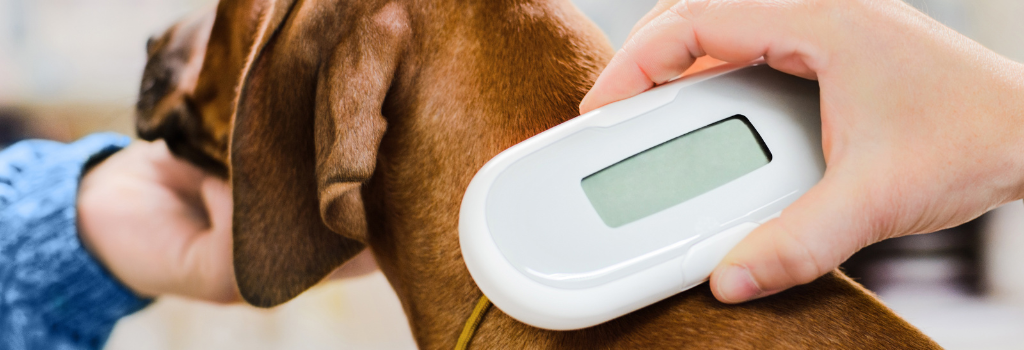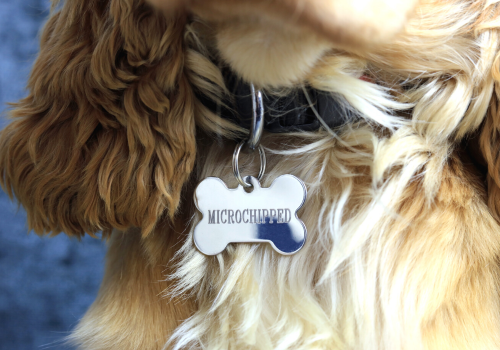Microchipping is a simple procedure that involves inserting a small chip under your dog’s skin so that it can be identified if it ever gets lost. At Bridge Veterinary Hospital, we understand the importance of keeping your pet safe and secure and are here to provide you with accurate information about dog microchipping. This page covers the basics of microchipping and why it is important, as well as the recovery process and other smart products that can connect to your dog’s microchip. Read on to learn more about dog microchipping and why it’s a great choice for all pet owners.
What Does Microchipping Mean for Your Dog?
Microchipping is a process that involves implanting a small chip, about the size of a grain of rice, under your dog’s skin to serve as a unique, permanent form of identification. This can help reunite you with your dog in case it gets lost, runs away, or is stolen. Microchips do not have a battery and are activated by a scanner that is passed over the area, emitting radio waves that transmit the identification number to the scanner and display the number on the screen. Microchips are not GPS devices and cannot track your pet’s location.
The microchip implantation process is simple and minimally painful, comparable to a typical injection. It is usually done during a routine veterinary visit and does not require surgery or anesthesia. A microchip generally lasts for the lifetime of your pet and does not need replacing.

Can Microchips be Used to Track Your Dog?
No, microchips are not GPS devices or location trackers. They serve as an identification method for lost pets. When a lost dog is found and brought to a veterinarian or animal shelter, they will scan for a microchip to get the unique ID number. This number is then used to search for the pet owner’s contact information in a pet recovery database.
How is a Microchip Used to Identify Your Dog?
A microchip is a permanent form of identification for your pet. It contains a unique ID number that is associated with your contact information in a pet recovery database. When a lost dog is found and taken to a veterinarian or animal shelter, they will scan the microchip for the ID number, which will then be used to search for the owner’s contact information in the database. This ensures that if your pet ever gets lost, you can be reunited with them quickly and easily.
Who Can Scan Your Dog’s Microchip Information?
The microchip can be scanned by any veterinarian, animal shelter, or rescue. All they need is a scanner that is compatible with the microchip. The ID number of the microchip will be displayed on their scanner, and they have access to search for the pet owner in the pet recovery database.
Is microchipping painful or dangerous for my pet?
Microchipping is a quick procedure, similar to a vaccination. Your dog may feel a slight pinch, but the discomfort is minimal and short-lived. At Bridge Veterinary Hospital, we can also offer a local anesthetic to ease any discomfort, or we can perform the procedure during your pet's spay or neuter surgery when they're already under anesthesia!
What Steps Will Be Taken if My Microchipped Dog Is Lost?
In the event that your dog is lost, the following steps will be taken to increase the chances of being reunited with them:
- Scanning for a microchip: When your lost pet is found and brought to a local council, vet clinic, or animal welfare organization, they will scan the animal for a microchip.
- Checking the microchip registry: The scanned microchip number is checked against a register, which contains your contact information.
- Contacting you: Once your details are located in the registry, you will be contacted so that you can be reunited with your pet (AVMA).
It is essential to update your contact information with the microchip registry and mark your pet as missing if they ever become lost. Many registries offer additional services, such as emailing veterinary practices, shelters, and rescues, which can help increase the chances of them being located and returned safely.
Why do Veterinarians Recommend Microchipping Your Dog?
Veterinarians and animal-rescue organizations highly recommend microchipping dogs for various reasons. Microchips provide a permanent and secure form of identification for pets, which significantly increases the chances of them being returned to their owners if lost. In addition, microchips are designed to last a lifetime, providing a reliable and low-maintenance identification method for pets. They also help clarify ownership disputes and can be used to quickly resolve theft cases by identifying the rightful owner. Furthermore, microchip databases store only the owner’s information necessary for reuniting them with their pet, while protecting personal information and giving pet owners the option to opt-in or opt-out of additional communications from the microchip company.
What if I Forget or Lose My Dog’s Microchip Information?
If you cannot find your pet’s microchip number, check the paperwork from their adoption, purchase, or the vet clinic where the microchip was implanted. To identify which company your pet’s microchip is registered with, visit AAHA and enter the microchip number. To update your pet’s microchip information, contact the microchip company directly and review your contact details. It is essential to keep your contact details up-to-date with the registry so that you can easily be reunited with your pet in case it gets lost or stolen.

Are there any other smart products that can connect to my dog's microchip?
Right now, there are a few smart products that connect to dogs’ microchips, and more are being developed. The only products you can currently connect to your dog’s microchip include smart pet feeders and dog doors.
Microchip pet feeders only open for a specific pet and are ideal for multi-pet households in which some animals have special diets. Microchip dog doors allow your canine companion to come and go as they please while keeping unwanted critters out.
Pet tech is evolving rapidly, so be on the lookout for additional microchip-compatible smart products in the near future!
To learn more about dog microchipping or schedule an appointment for your canine companion, please reach out to our friendly team. Microchipping takes seconds and could save you and your dog from years of heartache.
At Bridge Veterinary Hospital, your pet is our priority. If you have any questions, don't hesitate to call our team at (567) 361-3407, or you can email us at [email protected]. Our staff would love to talk with you!

